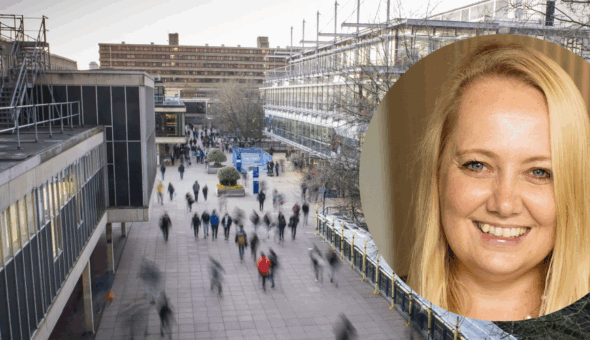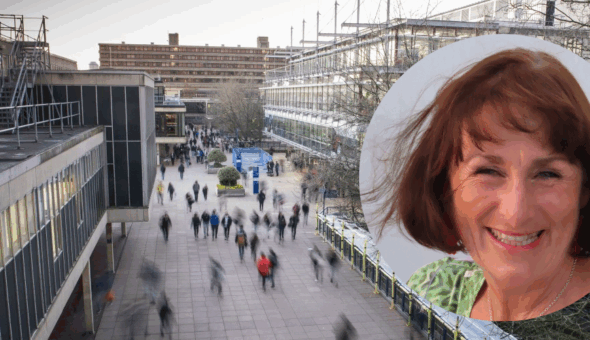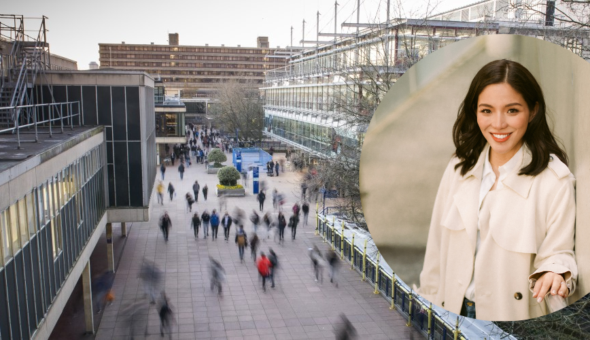When Daniel Jones enrolled at Bath, he was looking for practical and grounded training in simultaneous interpretation – the impressive skill of translating messages from a source language to a target language in real time.
He found what he needed in Bath’s master’s in interpreting and translating and has since gone on to build a successful career in a varied and challenging profession where no two days are the same.
Read on to discover his story.
Why did you choose to study at Bath?
I grew up on Dartmoor, west of Exeter, and have family spread between Devon and Wiltshire to the east of Bath. At the time I applied to Bath for my master’s I was recently married and we had settled in Oxford, so Bath represented the perfect location to reconnect with my roots and family and yet not be too far from my wife and her work.
I had previously been working a fair bit in French-speaking Africa for an organisation combating severe acute malnutrition and away for months at a time, so being close to home was particularly appreciated. Furthermore, I was very focused on making a successful bid to become a professional interpreter and my research suggested that Bath’s MA Interpretation and Translation represented the best possible UK-based route to this goal.

Did you have a particular career in mind when you chose your course?
Absolutely. When I came to Bath I already had one master’s and did not require another academic certificate, rather a practical and grounded training in a profession I wanted to enter as quickly as possible: simultaneous interpretation.
I had previously worked in the European Parliament in my 20s and then, in the field, spent considerable time collaborating with United Nations institutions. As my original degree was in languages, I was fairly certain that I wanted to sit and pass the UN’s accreditation exams for interpreters if possible – challenging though that goal was. I had given up my previous career to train as an interpreter and we could only survive on my wife’s income for a limited time, so I had one shot at success.
Can you tell us about your experience of studying here?
The Claverton Rooms! At the time, they were reserved as the post-graduate common room and we used to camp up there in groups and put each other through our paces recalling European politics, disarmament, renewable energy and human rights terms in German, Italian, Russian, Spanish, French and English as the exams loomed.
Earlier in the year things were a bit more light hearted. We were from all over so would also set up language exchange pairs. I had one with a fellow student from Huesca in Aragón – I went out to visit her and her family that summer to take a break after the end of year exams.
I will always have a soft spot for the language labs where we put in so much sweat and toil, the path over campus down Widcombe Hill towards the beautiful river and our favourite pub, The Raven, with its excellent pies!
Describe your career journey since graduating. What is a typical day like in your current role?
The summer I sat my Bath exams I was also invited to sit the UN’s accreditation exams. It was a hectic time but to my amazement I passed!
Things would probably not have gone as quickly for me were it not for Bath’s memorandum of understanding (MOU) relationship with the UN and the excellent outreach programme conducted between the two. I had not yet submitted my thesis or graduated when I had a phone call offering me my first three-day contract in late August in Geneva. I had to check who was calling three times!
The UN looked after me well in my first two years as a freelancer as I built up a portfolio of international institution clients – the International Labour Office and the World Health Organisation among others.
We moved out to a small Swiss village and started a family. Against the odds, my wife was able to transfer her academic career from Oxford to Bern. About seven years later I passed the staff exams and am now a UN staff interpreter and, more recently, became the UN’s MOU coordinator for the University of Bath. So once a year I get to return to the labs – and The Raven – and hopefully inspire others. 
A typical day in my role? There isn’t really such a thing. That is the beauty of the job! Today I am writing this in Baku, Azerbaijan as we wait for an outcome to negotiations at COP29. As they are now expecting the plenary to begin again this evening with four teams working back-to-back, our team will possibly start at around the 2am mark for a three-hour shift in a huge room with a high-level delegation from each of the world’s 190 odd countries. But back home in Geneva we usually work between 10am and 6pm. I have worked for the heads of state of many countries, but also the victims of unspeakable trauma and human rights abuse. Both are challenging, memorable and rewarding in different ways.
How did your studies help you to develop, professionally and/or personally?
The Bath interpretation course was instrumental in providing the necessary professional building blocks and skills in the interpretation booth to get me where I was going. My French simultaneous interpretation teacher had first-hand experience of interpreting in high-level settings such as the White House and Elysée Palace and helped set my horizons ambitiously. The course was the right mixture of exacting and inspiring.
I also went on a week-long placement to the UN in Geneva – the placements I am now responsible for facilitating from the other side. There is no doubt this was a key step towards success for me. There is a limit to what you can absorb intellectually in just a week, but walking into the rooms, booths and general environment you are aiming for has an enormous impact on your work when you return to finish the course.
What advice would you give to prospective students thinking about studying your course at Bath?
If you are serious about becoming an interpreter and want to study in the UK, you can’t do better than Bath’s MAIT course. Go for it, believe in yourself and enjoy it.
Language combinations matter because different markets and employers call for different skills. For example, the UN has six official languages and to work as an English-language interpreter there you will generally need a high level of French and Russian, or Spanish. Elsewhere there are different requirements. You can perfect existing languages during your course (mine improved hugely) but do not bank on learning new ones at the same time – you will have enough on your plate!
Knowledge and experience matter. The more you have – of literally anything and from anywhere – the better. You never know when it will come to your rescue!
And have fun, too.
Respond



